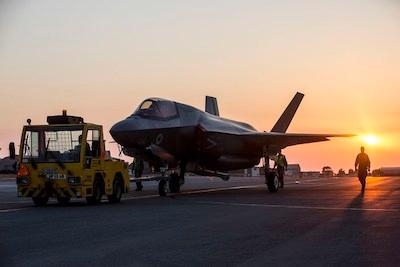Have Flown Alongside Typhoon Aircraft On Operational Flights Over The Skies Of Syria And Iraq
The U.K.'s newest and most advanced fighter jet, the Lightning F-35B, has successfully completed its first operational missions. F-35s have flown alongside Typhoon aircraft on operational flights over the skies of Syria and Iraq, as part of the ongoing fight against Daesh, the Defense Secretary has confirmed.

It follows a successful training period in Cyprus, known as Exercise Lightning Dawn, aimed at building capability for the aircraft and supporting elements.
Due to the exceptional performance of the aircraft, pilots, and support staff during this time, it was decided that they were ready to make their operational debut from RAF Akrotiri, alongside the Typhoons. "The F-35s are the most advanced jets our country has ever possessed and will form the backbone of British air defence for decades to come," said Defense Secretary Penny Mordaunt, Speaking at RAF Akrotiri. "They have passed every test their training has thrown at them with flying colours and their first real operational mission is a significant step into the future for the U.K.."
The first RAF F-35B operational sorties were flown on Sunday 16 June in support of Operation Shader, the U.K. contribution to the Global Coalition’s counter Daesh mission in Iraq and Syria. The two aircraft conducted a patrol over Syria, and U.K. F-35s have flown a further 12 sorties since then.
The F-35 is the first aircraft to combine radar-evading stealth technology with supersonic speeds and the ability to conduct short take-offs and vertical landings.
The Lightning force is jointly operated by the RAF and Royal Navy. With the ability to operate from land and sea, the F-35 forms a vital part of delivering a ‘carrier strike’ capability to the U.K. when combined with Britain’s new Queen Elizabeth Class aircraft carriers. "This first operational mission for the U.K.’s F-35 Lightning confirms the impressive progress which we have made in introducing this formidable new capability into service," said Chief of the Air Staff, Air Chief Marshal Sir Stephen Hillier. "It is (a) testament to the outstanding abilities of our dedicated and highly trained air and ground crew that 617 Squadron has achieved this important milestone so quickly and so effectively."
"It’s great to see our F35B Lightning jets already proving themselves on operations so early in their life cycle, ably demonstrating the fantastic capability these world-leading aircraft offer," said Admiral Tony Radakin CB ADC, First Sea Lord and Chief of Naval Staff. "This Autumn, our aircraft carrier HMS Queen Elizabeth will return to the East Coast of the United States to conduct Operational Trials with our Lightning Force, taking this 5th generation capability to the next level as they prove their ability to operate from the sea.
"For decades to come, this exciting new combination of aircraft carriers and F35B Lightnings will provide a potent, globally deployable carrier strike capability, a powerful conventional deterrent and the centrepiece of our country’s expeditionary forces."
Later in the year, 617 Squadron will embark in HMS Queen Elizabeth for the first time. The U.K. jets will conduct Operational Tests, alongside 17 Test and Evaluation Squadron, onboard the carrier in the USA during the WESTLANT 19 deployment, proving their capability at sea. This is a vital step on the path to the first Carrier Strike Deployment planned for 2021.
The U.K. currently owns 17 F-35B aircraft with the reformed 617 Sqn arriving back in the U.K. last year. More jets are due in Britain over the coming years, including the imminent arrival of 207 Sqn at RAF Marham, and there is an overall plan to procure 138 aircraft over the life of the program.
The program has already generated $12.9 billion worth of orders and at peak production will support thousands of British manufacturing and engineering jobs. "The pilots, crew and aircraft have exceeded all training objectives since deploying to Cyprus so it was only right that they made the next step on their journey," said U.K. Air Component Commander for the Middle East, Air Commodore Justin Reuter. "The U.K. has played a vital role in liberating swathes of territory once subjected to Daesh’s cruel regime, and the deployment of our newest and most advanced jets signals our commitment to the enduring defeat Daesh in Iraq and Syria."
The Defense Secretary also used the visit to hold a meeting with her Cypriot counterpart, Savvas Angelides, to further bolster bilateral ties.
(Source: U.K. Ministry of Defense. Image provided)
 A Crazy Tesla Flying Car is Coming
A Crazy Tesla Flying Car is Coming ANN's Daily Aero-Term (11.xx.25): NonApproach Control Tower
ANN's Daily Aero-Term (11.xx.25): NonApproach Control Tower Aero-News: Quote of the Day (11.01.25)
Aero-News: Quote of the Day (11.01.25) ANN's Daily Aero-Linx (11.01.25)
ANN's Daily Aero-Linx (11.01.25) Classic Aero-TV: EAA Introduces Angle of Attack Training
Classic Aero-TV: EAA Introduces Angle of Attack Training



